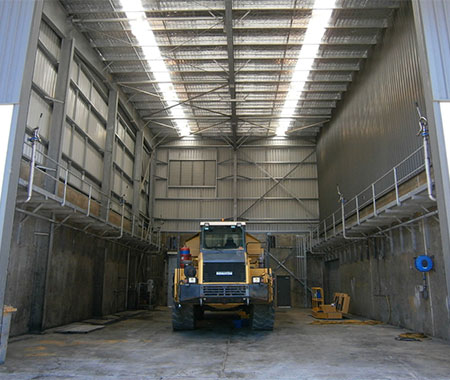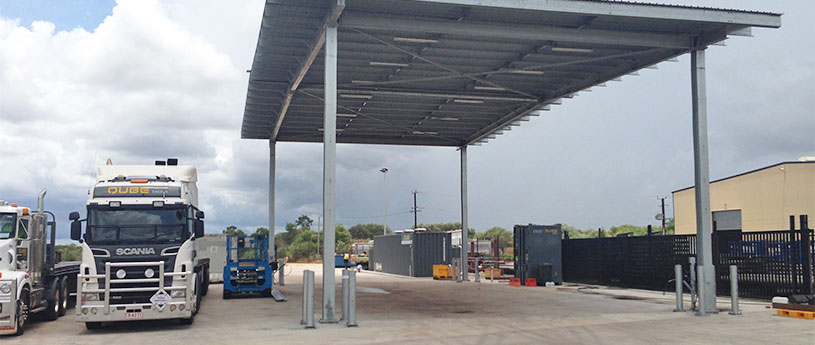Everything you need to know about roofed wash bays and wastewater management
Roofed wash bays are an effective, environmentally-friendly and water authority compliant solution for businesses that clean vehicles and heavy machinery on a regular or infrequent basis.
What is classified as a roofed wash bay?
 A wash bay is a purpose-built cleaning station, where vehicles and heavy machinery can be washed clean. A roofed wash bay is simply a wash bay that features an overhead roof.
A wash bay is a purpose-built cleaning station, where vehicles and heavy machinery can be washed clean. A roofed wash bay is simply a wash bay that features an overhead roof.
The roofing can be permanent, in which case it is usually made from steel or aluminium. Or it can be temporary, in which case it may be constructed from a steel frame with polyethylene fabric cover.
Roofed wash bays are regularly used within the automotive industry. Some businesses which use them include car retailers, car washes, and repair shops.
When to install a wash bay
Commercial and industrial operations, which wash vehicles or heavy equipment, are required by state water authorities to have a wash bay installed.
Whether the cleaning is regular or infrequent, a wash bay is still needed. The wash bay must also comply with water authority regulations surrounding the treatment of wastewater.
To be water authority compliant, a wash bay must feature appropriate wastewater treatment equipment.
What is required for the treatment of roofed wash bay wastewater?
A number of devices are required to treat wastewater from roofed wash bays. And wastewater must be treated before discharge – not doing so can lead to large fines or even business shut-down.
Required devices include:
- Oil separator
- In-ground collection pit
- Silt trap
This equipment removes oil, suspended solids, and hydrocarbons from the wastewater. Installation of these components is vital for gaining compliance with local water authority regulations.

"To be water authority compliant a wash bay must feature appropriate wastewater treatment equipment."
Why choose a roofed wash bay?
With a roofed wash bay, you can wash your vehicles in almost any weather. The roof stops rain and hail from interfering with your cleaning duties. It also prevents harsh sun from making your workspace uncomfortable.
Another benefit is that because stormwater runs off of your roof, you will not, in most cases, require additional equipment to manage stormwater, which has combined with wastewater.
A roofed wash bay may have a higher initial price tag when compared to an unroofed wash bay. However, the added ‘all-weather’ usability and treatment equipment savings may reduce your overall operational costs.
When should a roofed wash bay not be used?
A roofed wash bay can only house vehicles up to a specific height. Therefore, if your business washes cranes and other large heavy equipment on a regular basis, a roofed wash bay may not be suitable.
In these cases an unroofed wash bay, which does not feature a height restricting roof would be a more appropriate choice.
Are permits required when installing a wash bay?
Before installing a wash bay, contact your local water authority. They will be able to provide you with a trade waste permit, which will allow you to connect your system to the sewer.
If a sewer is not available, your local shire or council should be able to advise you on how to deal with wash water within your area.
More information
If you would like more information regarding roofed wash bays or wastewater management systems, contact the team at Cleanawater on: 1800 353 788
Must Read
VapourGard: Your ultimate odour control solution
Control odours effectively and safely with CleanaWater's VapourGard system. Ideal for industries such as mining, landfill operations, recycling, and more, the VapourGard system uses lightweight partic ...
Read moreControl Odour with VapourGard
Control odours effectively and safely with CleanaWater's VapourGard system. Ideal for industries such as mining, landfill operations, recycling, and more, the VapourGard system uses lightweight partic ...
Read more